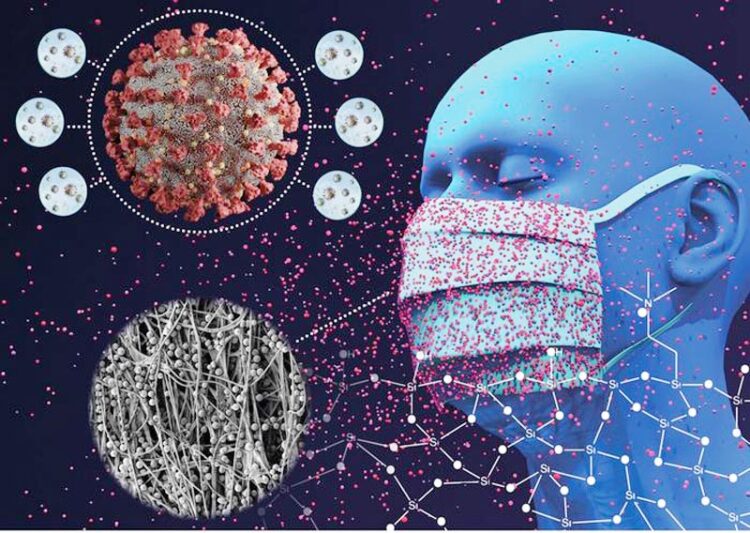New material captures coronavirus particles

A new material that captures coronavirus particles
Credit: University of Liverpool
… and could transform face mask efficiency.
University of Liverpool researchers develop a new material that captures coronavirus particles and could transform the efficiency of face masks.
A research team at the University of Liverpool has developed a new material that captures coronavirus particles and could transform the efficiency of face masks and other filter equipment to stop the spread of COVID-19 and other viruses.
In a paper published in the journal Nature Communications, the team showed that the new material used in a conventional face mask was approximately 93% more efficient at capturing proteins, including coronavirus proteins, with little impact on breathability.
The Liverpool scientists behind the new material are Professor Peter Myers, a research leader in chromatography, and Dr Simon Maher, a mass spectrometry expert.
They had been collaborating on high performance liquid chromatography processes where proteins “stick” to the surface of the chromatographic support materials.
During the pandemic, Professor Myers realised that reversing this process would provide a way to absorb proteins, and specifically the protruding S1 spike protein which covers the outer lipid membrane of the SARS-CoV-2 virus.
Working together, the team from the University of Liverpool’s Department of Chemistry and Electrical Engineering and Electronics, “re-tuned” the surface of the spherical silica particle they used for chromatography to make the surface very “sticky” for the COVID-19 S1 spike protein.
At the same time, they increased the porosity of the silica particle to give it a very large surface area of 300m2 per gram, which is approximately the same area as a tennis court. Furthermore, they increased the internal volume of the silica sphere to provide a large capacity to “capture” the virus.
The new material is at proof of concept stage and the team has shown it works in face masks in addition to air filters such as those used in aeroplanes, cars and air conditioning.
The group, which includes the Liverpool School of Tropical Medicine, also developed a method to attach the sticky particles onto the surface of a conventional face mask.
Professor Peter Myers said: “This proof of concept research has only scratched the surface and whilst COVID-19 is no longer a global threat to our health, this material has the potential to be used in a wide range of applications. Our research team is looking at developing more advanced “sticky” surfaces for a variety of bioaerosols including the new Covid variant BA.2.86 as well as influenzas and other deadly viruses such as Nipah.”
The paper `Attaching protein-adsorbing silica particles to the surface of cotton substrates for bioaerosol capture including SARS-CoV-2‘ (doi:10.1038/s41467-023-40696-x ) is published in Nature Communications.
Journal: Nature Communications
DOI: 10.1038/s41467-023-40696-x
Article Title: Attaching protein-adsorbing silica particles to the surface of cotton substrates for bioaerosol capture including SARS-CoV-2
Article Publication Date: 18-Aug-2023
Media Contact
Sarah Stamper
University of Liverpool
sarah.stamper@liv.ac.uk
Cell: 07970247396
All latest news from the category: Materials Sciences
Materials management deals with the research, development, manufacturing and processing of raw and industrial materials. Key aspects here are biological and medical issues, which play an increasingly important role in this field.
innovations-report offers in-depth articles related to the development and application of materials and the structure and properties of new materials.
Newest articles

First-of-its-kind study uses remote sensing to monitor plastic debris in rivers and lakes
Remote sensing creates a cost-effective solution to monitoring plastic pollution. A first-of-its-kind study from researchers at the University of Minnesota Twin Cities shows how remote sensing can help monitor and…

Laser-based artificial neuron mimics nerve cell functions at lightning speed
With a processing speed a billion times faster than nature, chip-based laser neuron could help advance AI tasks such as pattern recognition and sequence prediction. Researchers have developed a laser-based…

Optimising the processing of plastic waste
Just one look in the yellow bin reveals a colourful jumble of different types of plastic. However, the purer and more uniform plastic waste is, the easier it is to…



